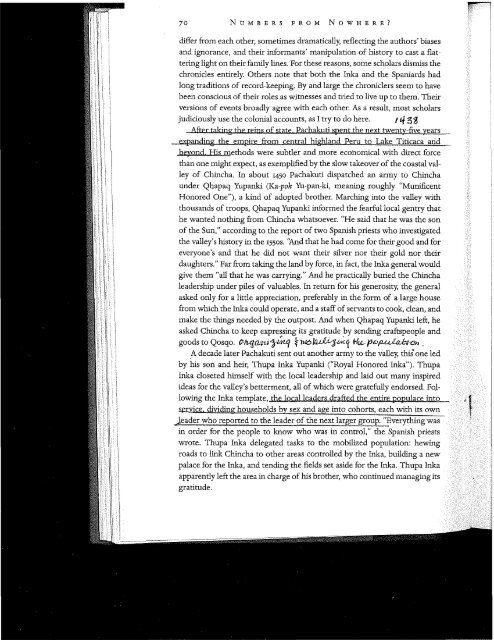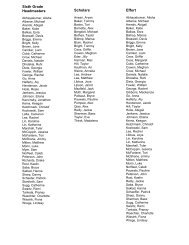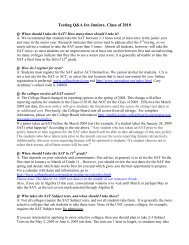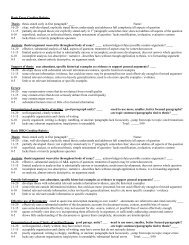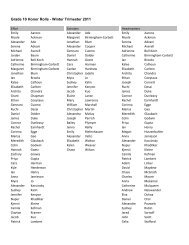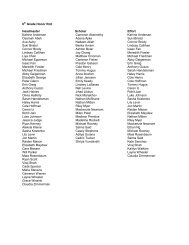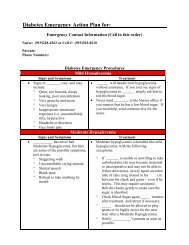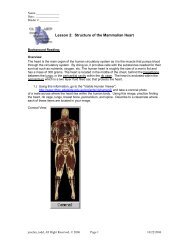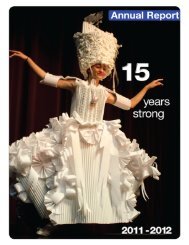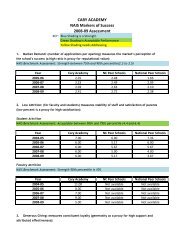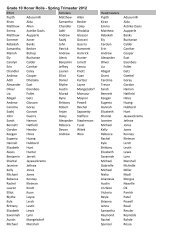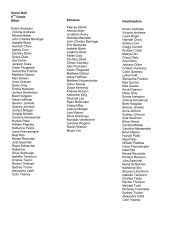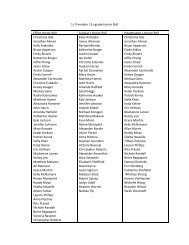CHARLES C. MANN - Cary Academy
CHARLES C. MANN - Cary Academy
CHARLES C. MANN - Cary Academy
- No tags were found...
You also want an ePaper? Increase the reach of your titles
YUMPU automatically turns print PDFs into web optimized ePapers that Google loves.
70 NUMBERS FROM NOWHERE?differ from each other, sometimes dramatically, reflecting the authors' biasesand ignotance, and their informants' manipulation of history to cast a flatteringlight on their family lines, For these reasons, some scholats dismiss thechronicles entirely, Others note that both the Inka and the Spaniards hadlong traditions of record-keeping, By and large the chroniclers seem to havebeen conscious of their roles as witnesses and tried to live up to them, Theirversions of events broadly agree with each other. As a result, most scholarsjudiciously use the colonial accounts, as I try to do here.f 115 gAfter takjng the reins Of state pachakllti $.pent the next twent}dlve yearsexpanding the empire from central highland Peru to Lake Titicaca aridbeyond His methods were subtler and more economical with direct forcethan one might expect, as exemplified by the slow takeover of the coastal valleyof Chincha. In about 1450 Pachakuti dispatched an army to Chinchaunder Qhapaq Yupanki (Ka-pok Yu-pan-ki, meaning roughly "MunificentHonored One"), a kind of adopted brother. Marching into the valley withthousands of troops, Qhapaq Yupanki informed the featfullocal gentry thathe wanted nothing from Chincha whatsoever. "He said that he was the sonof the Sun," according to the report of two Spanish priests who investigatedthe valley's history in the 1550S. 'Md that he had come fat their good and foreveryone's and that he did not want their silver nor their gold not theirdaughters." Far from taking the land by force, in fact, the Inka general wouldgive them "all that he was carrying." And he practically buried the Chinchaleadership under piles of valuables. In return for his generosity, the generalasked only for a little appreciation, preferably in the form of a large housefrom which the Inka could operate, and a staff of servants to cook, clean, andmake the things needed by the outpost. And when Qhapaq Yupanki left, heasked Chincha to keep expressing its gratitude by sending craftspeople andgoods to Qosqo. Ci'1uj(l)I.,.jt~ t1>tO~1t->~1IfuL.p",p.u..e.~ .A decade later Pachakuti sent out another army to the valley, this one ledby his son and heir, Thupa Inka Yupanki ("Royal Honored Inka"). ThupaInka closeted himself with the local leadership and laid out many inspiredideas for the valley'S betterment, all of which were gratefully endorsed. FoJlowingthe Inka template, the local leaders drafted the entire populace intostlt.vice. diViding households by sex and age into cohorts, each with its own.leader who reported to the leader of the next larger group. "Everything wasin order for the people to koow who was in control," the Spanish priestswrote. Thupa Inka delegated tasks to the mobilized population: hewingroads to link Chincha to other areas controlled by the Inka, building a newpalace for the Inka, and tending the fields set aside for the Inka. Thupa Inkaapparently left the area in charge of his brother, who continued managing itsgratitude.it,"f


